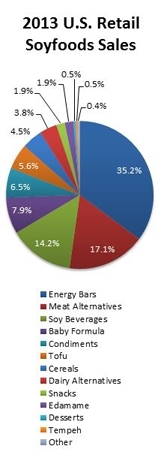07.09.14
The United Soybean Board's 21st Annual “Consumer Attitudes About Nutrition” study, reported that consumers are increasingly interested in the healthfulness of their food. In addition, the nutritional content of the food that their children are eating is a key priority for shoppers.
The 21st Annual “Consumer Attitudes About Nutrition” study is conducted by the United Soybean Board to address current topics of interest to the food and health industries. The 2014 study was conducted by an independent research firm in February 2014 and includes 1,000 random surveys consistent with the U.S. population.
Respondents identified these issues as the top three important health and nutrition issues facing U.S. children:
• Instilling healthy eating habits (73%, up 10% from 2013)
• Reducing childhood obesity (71%, up 12% from 2013)
• Increasing consumption of fruits and vegetables (67%, up 10% from 2013)
As diet becomes an increasingly strong concern, 91% of consumers consider nutrition important when grocery shopping. "All kids need a healthy, nutritious diet and that's where soy fits in because it is one of the most nutrient-rich foods in our food supply," said Amy Hendel, R-PA. "I think soy is so great for kids because it's so versatile, so nutritious and also economical." In fact, the study found that more than 90%of respondents reported no negative associations between soy and children's health.
In addition to the data on children, the study found that 74% of consumers rate soy products to be "somewhat healthy" or "very healthy," and 31% used soy foods or beverages once a week or more. "High protein" topped the list of health benefits associated with soy. In addition:
• 63% reported they would be willing to pay more for healthier options
• 45% seek out food products specifically because they contain soy
• Soy products are consumed most often at dinner (39%), followed by breakfast (34%), lunch (24%) and other times during the day
Consumers also have a keen interest in the healthfulness of fats and oils. The majority recognizes omega-3 fats as "healthy" and trans fats as "unhealthy." Soybean oil is the principle source of omega-3s in the U.S. diet and contains zero grams trans fats, according to the United Soybean Board. They found that consumers who recognize the health benefits of soy for children are aware that soy is "nutritious" and "may aid in weight loss/prevent obesity."
The 21st Annual “Consumer Attitudes About Nutrition” study is conducted by the United Soybean Board to address current topics of interest to the food and health industries. The 2014 study was conducted by an independent research firm in February 2014 and includes 1,000 random surveys consistent with the U.S. population.
Respondents identified these issues as the top three important health and nutrition issues facing U.S. children:
• Instilling healthy eating habits (73%, up 10% from 2013)
• Reducing childhood obesity (71%, up 12% from 2013)
• Increasing consumption of fruits and vegetables (67%, up 10% from 2013)
As diet becomes an increasingly strong concern, 91% of consumers consider nutrition important when grocery shopping. "All kids need a healthy, nutritious diet and that's where soy fits in because it is one of the most nutrient-rich foods in our food supply," said Amy Hendel, R-PA. "I think soy is so great for kids because it's so versatile, so nutritious and also economical." In fact, the study found that more than 90%of respondents reported no negative associations between soy and children's health.
In addition to the data on children, the study found that 74% of consumers rate soy products to be "somewhat healthy" or "very healthy," and 31% used soy foods or beverages once a week or more. "High protein" topped the list of health benefits associated with soy. In addition:
• 63% reported they would be willing to pay more for healthier options
• 45% seek out food products specifically because they contain soy
• Soy products are consumed most often at dinner (39%), followed by breakfast (34%), lunch (24%) and other times during the day
Consumers also have a keen interest in the healthfulness of fats and oils. The majority recognizes omega-3 fats as "healthy" and trans fats as "unhealthy." Soybean oil is the principle source of omega-3s in the U.S. diet and contains zero grams trans fats, according to the United Soybean Board. They found that consumers who recognize the health benefits of soy for children are aware that soy is "nutritious" and "may aid in weight loss/prevent obesity."




















